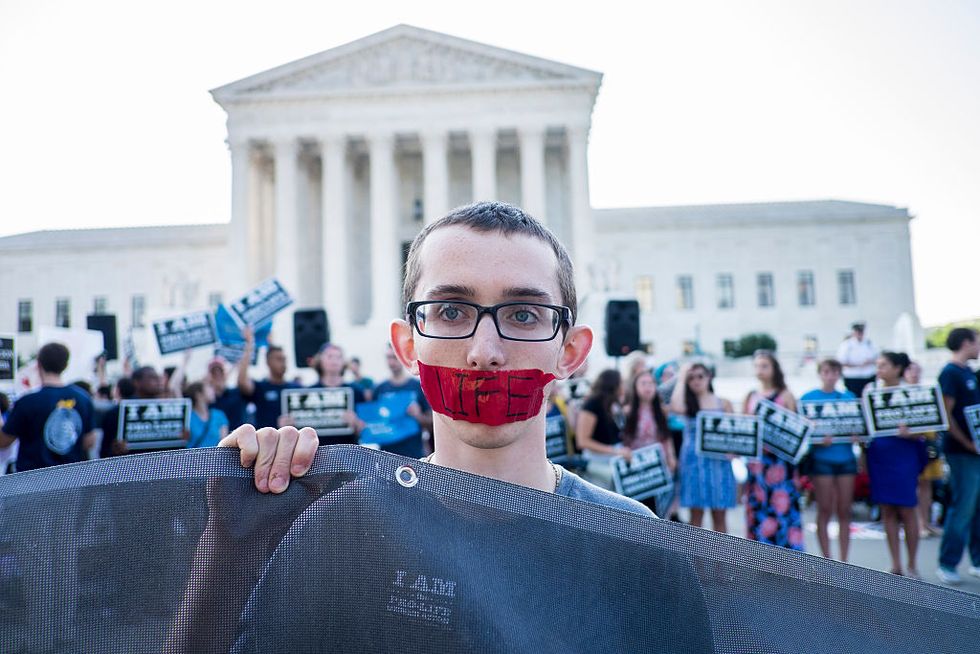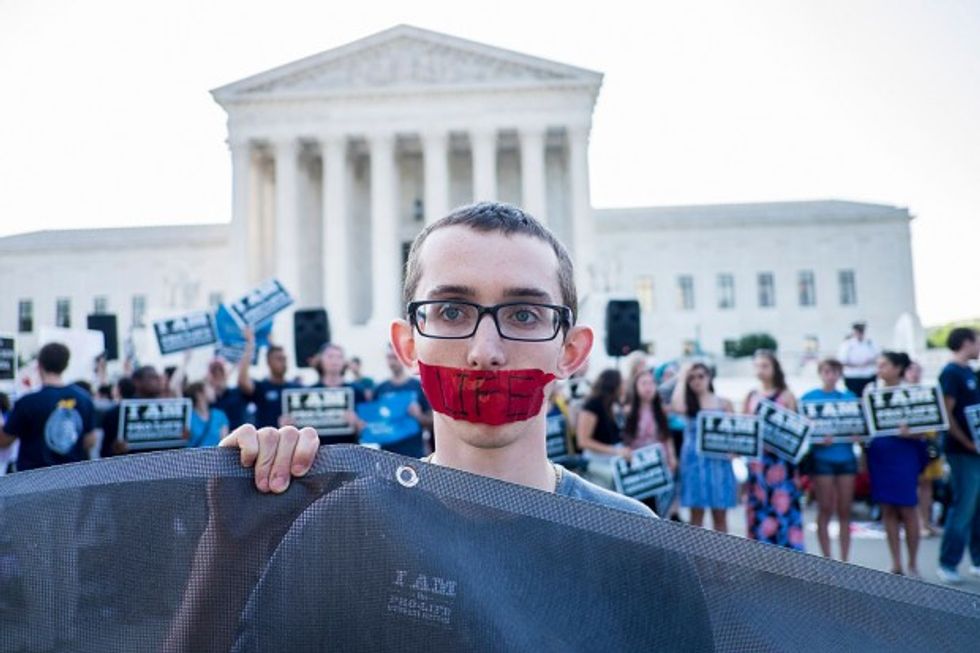
Pro-life activist, Ryan Orr, 17, of Manassas, Va, waits holds a silent vigil as he waits for rulings in front of the U.S. Supreme Court on June 27, 2016 in Washington, DC. (Pete Marovich/Getty Images)

If one produces enough abortion-related content, he will notice certain trends and patterns among the pro-choice responses. Certain arguments are made repeatedly and become regular talking points in discussions. Here are some of the arguments I’ve noticed recently, and a brief response to each:
To refer to zygotes, embryos and fetuses as potential human beings is biologically inaccurate. For starters, each of these terms describes a stage of development of a living organism.
Second, we know that a zygote, embryo, or fetus is a living human being because it is growing. If it’s growing, it’s alive, and if it’s alive, it must belong to a species. That species is homo sapiens. Further, if it’s growing, that makes the zygote, embryo, or fetus qualitatively different from an acorn, a single sperm, egg or any entity that is not a unique, growing organism.

Third, a human embryo has a beating heart 21 days after conception and measurable brain waves about 45 days after conception. By 42 days the skeleton is formed and the brain is controlling the movement of muscles and organs. All that happens before the unborn human being is even classified as a fetus. At varying times between the fifth and 12th week after conception, the preborn baby will be able to suck his thumb, smile, squint, kick, roll over, make a fist, curl his toes, and grasp an object placed in the palm.
To deny that such an organism is a human being is to outright reject prenatal science. Indeed, even Peter Singer, one of the most pro-abortion philosophers on the planet, acknowledges that a unique human being is formed at conception (as do these quotes from medical textbooks).
Once we recognize the preborn child as a human being, it’s easier to frame the discussion a different way. We are not advocating that the government force a woman to give birth against her will. Rather, recognizing the preborn organism as a human being, we are advocating that he or she has the right to not be killed.
It doesn’t rob the woman of liberty to tell her she can’t kill her preborn baby any more than it robs of her liberty to tell her she can’t kill her toddler. Liberty doesn’t involve the ability to take the life of another human being.
Further, the differences between an preborn human and a born human are differences in size, functional ability, degree of dependence, and environment. While there are obvious differences between carrying a preborn baby and caring for a newborn, none of the differences allow for the destruction of the preborn life. Further, none of the differences between a preborn human being and a born human being make one any more or less human than the other. They are both fully human and deserve the protection of the law.
Just for reference, tyranny is defined as cruel and unfair treatment by people with power over others. Abortion is, quite literally, a textbook example of tyranny. One human being with power (the mother) is given all the rights, while the weaker human being (the preborn baby) is given none. If one opposes tyranny, it does not make any sense at all to support the ability of the strong to kill the weak.
[sharequote align="center"]Abortion is, quite literally, a textbook example of tyranny.[/sharequote]
One could expand the definition of tyranny so that it includes an oppressive government. Even still, a government that allows a stronger entity to kill a weaker entity is guilty of sanctioning tyranny. Conversely, the government which protects the rights of the weakest and most defenseless in its population is not engaging in tyranny, but rather performing its most primary and basic function.
I think what this person meant to say is that without the right to life, all other rights and liberties are cheapened. That certainly makes more sense.
Bodily autonomy may be a basic human right, but it is not an absolute right. Nobody has complete authority to do whatever they want with their body. That would lead a society directly into chaos. Most of us would acknowledge that our right to bodily autonomy ends right where another’s right to life begins. You are not free to use your bodily autonomy to take someone else’s life.
One could flip this around and try to say that the baby’s right to life ends where the mother’s right to bodily autonomy begins. In this case, we are weighing the life of the baby against the right of the mother to reject use of her body to somebody who will not survive without it. But once we recognize that a preborn child, as a human being, has the right to not be killed, it follows that the preborn child’s right to life takes precedence over the mother’s right to bodily autonomy.
Again, the right to life is infinitely more basic and primary than the right to bodily autonomy, and it means nothing if it doesn’t start at a human being’s first moment of existence. The right to life is the first and foremost among all human rights because, upon it, all the other rights are predicated. Every single other right means nothing if you don’t have the right to life. You cannot say that about the right to bodily autonomy. As such, the life of the preborn takes precedence over any bodily autonomy rights.
The state has all kinds of laws and regulations regarding what a person can and cannot do with his or her body. The “forced birth” argument is an empty argument because it ignores the human being-ness of the preborn baby. The state doesn’t force birth any more than it “forces” one person to not kill their neighbor or another person not to rape their classmate.
Laws protecting innocent life are not tyrannical laws compelling certain actions by one person or another; they are laws designed to protect the most basic right given to all human beings.
On the contrary, laws that allow for the destruction of preborn life are tyrannical in the classical sense of the term tyranny and rob an entire demographic of the most basic human right. Such laws are a perversion of justice and must therefore be abolished.
Cullen Herout is a pro-life, pro-family writer. He has a passion for writing about life issues, Marriage, fatherhood, and creating a culture of life. Follow him on Facebook here or at his own blog, Ready To Stand.
–
TheBlaze contributor channel supports an open discourse on a range of views. The opinions expressed in this channel are solely those of each individual author.